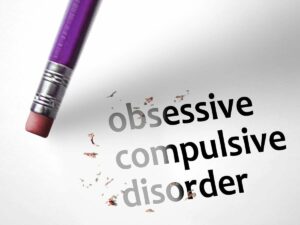If you have OCD, then you know that triggers can be a big problem. Triggers are anything that sets off your obsessive thoughts and compulsive behaviors. They can be anything from people to places to things. In this blog post, we will discuss what triggers are actually, help you identify some of the most common OCD triggers, and provide some tips on how to avoid them.
Contents
What Do Triggers Mean?
 In the context of mental disorders, triggers can be defined as “an action that leads to an adverse reaction”. In other words, a trigger is something that sets off a negative emotional or mental response. These triggers are quite common, and almost everyone experiences them at some point in their lives.
In the context of mental disorders, triggers can be defined as “an action that leads to an adverse reaction”. In other words, a trigger is something that sets off a negative emotional or mental response. These triggers are quite common, and almost everyone experiences them at some point in their lives.
However, for people with OCD, these triggers can be particularly distressing. And often lead to compulsions or other negative behaviors. In OCD triggers, the triggers can be either internal or external. This is so because they can be related to thoughts, feelings, or experiences that are either within the person’s control or out of their control.
OCD is the condition that refers to when someone experiences obsessions and/or compulsions that are so severe that they interfere with their daily life. Obsessions are defined as “intrusive, persistent, and unwanted thoughts, impulses, or images” while compulsions are “repetitive behaviors or mental acts that a person feels compelled to perform to relieve anxiety or distress”.
There are many different types of OCD triggers. And it’s important to note that what might be a trigger for one person may not be a trigger for another. This is because everyone experiences OCD in different ways.
What Are The Types Of OCD Triggers?
The types of OCD triggers are more likely to create a condition of OCD. Otherwise, these OCD triggers can make your existing symptoms more severe. These types of triggers can be divided into four main categories:
- Environmental triggers
- Emotional triggers
- Interpersonal triggers
- Situational triggers
Let’s take a closer look at each of these types of OCD triggers.
Environmental OCD Triggers
Environmental OCD triggers are defined as anything in your external environment that can bring the symptoms or make them worse. Some examples of environmental OCD triggers include:
- Fear of contamination – this can be triggered by seeing someone else touch something that you consider to be contaminated, such as a doorknob or a shake.
- Fear of harm – is triggered by seeing someone else in a situation where they could be harmed, such as crossing the street or driving a car.
- Loud noises – this can be triggered by hearing a loud noise, such as an ambulance siren or a fire alarm.
- Chaotic environments – in this case, the trigger is anything that creates a feeling of chaos or disorder, such as a messy room or a crowded place.
These environmental OCD triggers cause a change in the brain. The changes can be observed through functional magnetic resonance imaging (fMRI).
Emotional OCD Triggers
In this, the emotional OCD triggers are anything that causes a change in the emotional state. Emotional triggers are directly related to the emotions of fear, anxiety, and stress. It is important to understand that there is always an ongoing stressor in the life of a person with OCD. The emotional trigger can be anything that causes an increase in the level of stress.
For example, if you are worried about your job, then any change in your work situation can trigger your OCD symptoms. Or you might have a relationship trigger. In this case, any change in your relationship, such as a fight with your partner, can trigger OCD symptoms. Moreover, this type of trigger affects the obsession, not the compulsion. It is believed that this even stressed more upon a sense of perfectionism.
Interpersonal OCD Triggers
 It is more often related to the people around you and how they interact with you. In this case, the trigger is usually some kind of interaction with other people. For example, if you have OCD and you are afraid of contamination, then any time someone touches you, it can trigger your symptoms.
It is more often related to the people around you and how they interact with you. In this case, the trigger is usually some kind of interaction with other people. For example, if you have OCD and you are afraid of contamination, then any time someone touches you, it can trigger your symptoms.
Another example might be if you have OCD and you are worried about making mistakes. In this case, any time someone criticizes you or you make a mistake, it can trigger your OCD symptoms. For a clear view, these type of triggers includes:
- Criticism
- Rejection
- Loneliness
- Being ignored.
You can understand this type of trigger as anything that causes a change in the way you interact with other people.
Situational OCD Triggers
These are triggers that are related to specific situations. For example, if you have OCD and you are afraid of contamination, then any time you are in a situation where there is a potential for contamination, it can trigger your symptoms.
Another example might be if you have OCD and you are worried about making mistakes. In this case, any time you are in a situation where you might make a mistake, it can trigger your OCD symptoms.
Some specific examples of situational OCD triggers include:
- Being in a crowded place
- Using public transportation
- Going to the doctor
- Being in a new place
- Seeing blood.
In situational OCD triggers, it is important to understand that the trigger itself is not the problem. The problem is the way that you react to the trigger. If you have OCD, then you will tend to react in a way that makes your symptoms worse.
Now that we have looked at some of the different types of OCD triggers, let’s take a closer look at triggers that an individual faces more likely
OCD Triggers Specific To An Individual Obsessions
 Certain obsessions are more likely to trigger OCD in individuals who are already susceptible. Some of the most common obsessions that can trigger OCD include:
Certain obsessions are more likely to trigger OCD in individuals who are already susceptible. Some of the most common obsessions that can trigger OCD include:
- Contamination: This type of obsession is often characterized by a fear of germs or dirt. People with this type of OCD may obsessively wash their hands or clean their homes in an attempt to avoid contamination.
- Hoarding: This obsession can be triggered by a fear of losing something important or a belief that certain objects are too valuable to throw away. People with hoarding OCD may compulsively hoard items even if they have no use for them.
- Symmetry – It is characterized by a need for order and symmetry. People with this type of OCD may spend hours arranging objects in a certain way or obsessively cleaning their homes.
- Perfectionism – Excessive concern with order, perfection, and control. People with this type of OCD often have very high standards for themselves and others.
- Loss of control – Losing control in a particular situation can trigger OCD. This may be losing control over one’s own emotions or behaviors, or it may be a fear of losing control over a situation.
- Unwanted thoughts – This is the most common type of OCD trigger. It can be anything from a fear of contracting a disease to intrusive thoughts about harming someone.
- Religious and moral obsessions – Some people with OCD may have obsessions about religious or moral issues. This may include a fear of offending God or a compulsive need to confess one’s sins.
How To Avoid These OCD Triggers?
This is very important to do because if you can avoid your triggers, you can avoid your OCD symptoms to get more severe. There are a few things that you can do to avoid these triggers:
Become Aware Of Your Triggers
When you want to avoid something, the first step is always to become aware of it. This means that you need to be able to identify your triggers. Once you know what causes your OCD symptoms to flare up, you can start to avoid those situations. Being aware of the OCD triggers is the key to managing the condition.
Moreover, when you identify the triggers, start to face those. It may sound scary and impossible, but it will help you a lot in the long term. Facing your fears will help you to overcome them and it will make them less triggering. You can try writing your triggers and fears down, and then start to slowly face them one by one.
Talk To Someone Who Understands
If you are struggling to identify your triggers on your own, talking to someone who understands OCD can be very helpful. They will be able to help you figure out what might be causing your symptoms and how you can avoid those triggers in the future. It can be your family members with whom you are comfortable. And also your friends who can provide a safe and supportive environment.
Support groups are also a great resource when it comes to understanding and managing OCD triggers. There are many online and in-person support groups available for people with OCD. Talking to other people who have OCD can help you feel less alone and can give you some great tips on how to manage your triggers.
Also, this is the most affordable choice and effective. Because your family members of supports groups have vast experience with OCD. You can consider social media, chat rooms for OCD triggers. Choose wisely that suits you and your condition.
Create A Safe Space For Yourself
 Having a safe space is important for everyone, but it can be especially helpful if you have OCD. This is a place where you feel comfortable and relaxed. It can be anywhere that makes you feel good. It is a place where you can go when you are feeling anxious or triggered.
Having a safe space is important for everyone, but it can be especially helpful if you have OCD. This is a place where you feel comfortable and relaxed. It can be anywhere that makes you feel good. It is a place where you can go when you are feeling anxious or triggered.
The main purpose of a safe space is to help you feel calm and relaxed. It can be your comfort zone, your place where you can be yourself without judgment. Or a place where you can go to relax and de-stress. It can be your bedroom, bathroom, or any other place that makes you feel safe.
A safe space should be free of triggering objects or situations. This means that you should not have anything in your safe space that could trigger your OCD symptoms. For example, if you are afraid of germs, you should not have any objects in your safe space that could be contaminated.
Make A Plan
Once you know what your triggers are, it is important to make a plan for how you will avoid them. This might mean changing your routine, avoiding certain people or places, or anything else that will help you stay away from your triggers. Also, have a backup plan for when you are feeling triggered. This could be something like taking a break from whatever you are doing, listening to calm music, or anything else that will help you relax.
Making a plan is important because it will help you to stay on track and avoid your triggers. It can be helpful to write your plan down so that you can refer to it when you are feeling triggered. Because triggers are something that happens suddenly and unexpectedly, it is important to be prepared for when they happen.
Try Distraction Techniques
If you are struggling to avoid your triggers, distraction techniques can be very helpful. This can involve anything that takes your focus away from your OCD thoughts and symptoms. Distraction techniques can be different for everyone, so find something that works for you and stick with it. Moreover, it is best to have a few different distraction techniques so that you can switch between them if one stops working.
Some people find that listening to music or reading books helps to distract them from their OCD thoughts. Others find that doing puzzles or playing games helps to take their mind off of their symptoms. Experiment with different things and see what works for you.
Practice Self-Care
Self-care should be the priority when you have OCD. This means taking care of yourself both mentally and physically. People most of the time avoid self-care and seek short-term solutions or outside help.
However, it is essential to take care of your well-being first to manage OCD triggers. A person whose OCD triggers must remember that it is “YOU” who can best help you. And when you’re willing to work out then only someone else can help you.
So, start the help within yourself. Take care of yourself in every possible way. Some of these include;
- Get plenty of sleep.
- Eat a healthy diet.
- Exercise regularly.
- Make time for yourself to relax.
- Try yoga and meditation.
These things will help you to feel your best and will give you the energy you need to deal with your OCD symptoms. You can also consider talking to your doctor about any self-care methods that you are thinking about trying.
Seek Professional Help
 If you are struggling to manage your OCD on your own, professional help can be vital. A therapist who specializes in OCD can help you develop a treatment plan that will work for you. They can also provide you with support and guidance as you work to overcome your OCD. A therapist can be a valuable part of your support system. If you are considering seeking professional help, there are a few things you should keep in mind.
If you are struggling to manage your OCD on your own, professional help can be vital. A therapist who specializes in OCD can help you develop a treatment plan that will work for you. They can also provide you with support and guidance as you work to overcome your OCD. A therapist can be a valuable part of your support system. If you are considering seeking professional help, there are a few things you should keep in mind.
- First, make sure to find a therapist who has experience treating OCD.
- Second, make sure that you feel comfortable with the therapist and that they understand your needs.
- Third, be prepared to commit to treatment. This means attending therapy sessions regularly and doing the work that is assigned to you.
Treating OCD can be a long and difficult process, but it is possible to overcome your symptoms with the right help. Try Mantra Care for the best help. Mantra Care is an app that connects you with a mental health professional who can provide you with support and guidance. You can also visit the website of Mantra Care and can book your free consultation today.
Remember That Things Will Get better
It is important to remember that things can and will get better. Even if it feels like your OCD is never going to go away, it is important to hold onto hope. With treatment, you can learn to manage your OCD and live a happy and fulfilling life. It largely includes self-care, seeking professional help, and practicing healthy coping mechanisms.
So be hopeful and patient with yourself. Things take time, but with the right help, you can overcome OCD. You can try mindfulness techniques to be patient and positive, such as;
- Focus on your breathing.
- Focus on the present moment.
- Allow yourself to feel whatever you are feeling.
- Observe your thoughts without judgment.
- Practice self-compassion.
Conclusion
To conclude, OCD triggers are difficult to identify and even difficult to avoid. However, it is important to be aware of the possibility of triggers to manage OCD. If you or someone you know is struggling with OCD, contact Mantra Care, which is here to help you in every step. Visit the website today and book your free consultation. We will be happy to help you. Stay strong!
We hope this article helped understand OCD triggers and how to avoid them. If you have any questions, please don’t hesitate to contact us. We’re here to help. Thanks for reading!
If you are looking for affordable Online OCD Counseling MantraCare can help: Book a trial OCD therapy session


